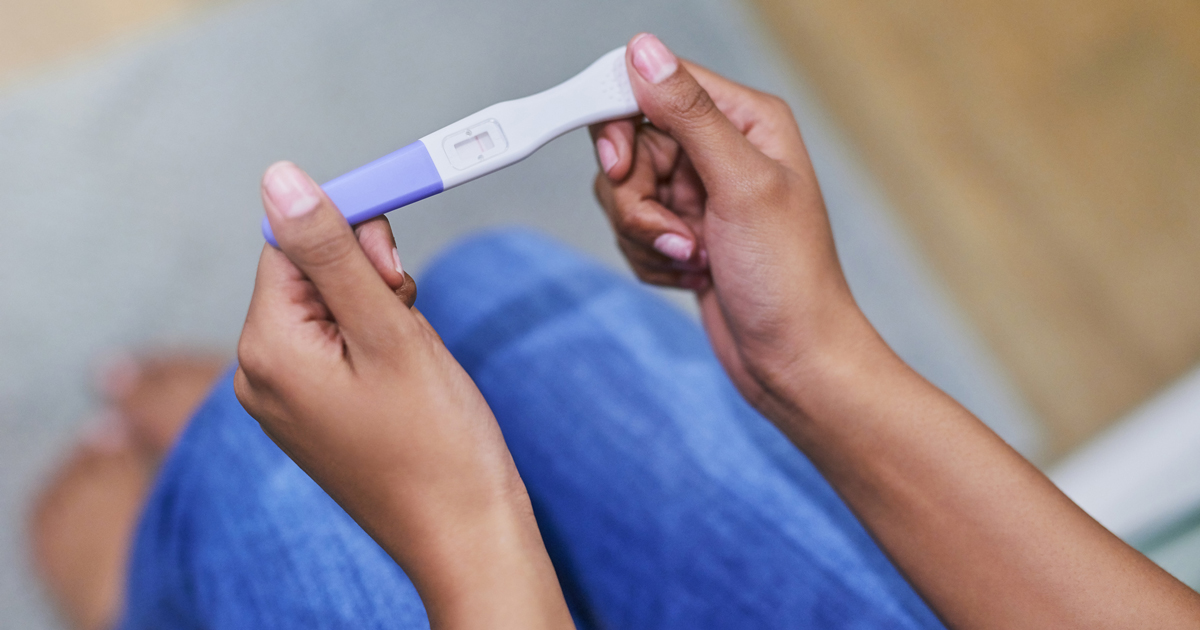Can I trust the results of my home pregnancy test?

If you are trying to get pregnant or have been pregnant, you probably remember the emotion and excitement you felt when waiting to see the results of a home pregnancy test. But even after you've read the results, you still may have some lingering doubt as to whether the positive or negative results you received are indeed accurate.
"If you are administering the pregnancy test after a missed period, in the majority of cases, the results of your home pregnancy test are likely to be correct," says Katherine Lessman, MD, Nebraska Medicine obstetrician-gynecologist. "Instances in which women get false negatives are usually associated with early response pregnancy tests. That's because timing is very important."
What happens when I get pregnant?
When you get pregnant, your body produces a hormone called chorionic gonadotropin, otherwise known as hCG. This hormone will increase with time after conception and can be detected in your urine. Home pregnancy tests are based on the presence of this hormone. However, hCG levels are very low for the first few weeks following conception.
"Performing an early pregnancy test within the first couple weeks after you believe you have conceived, will result in a greater likelihood that you will have a false negative, notes Dr. Lessman. In all cases, testing nine days after conception is too early."
When to get the most accurate results
"You are going to get the most accurate results if you wait at least seven days after a missed period," says Dr. Lessman. "To confirm the results, repeat the test in two or three days. If the test produces another positive result, you can trust you are pregnant.
Testing too late (after the first trimester) can also be an issue. "The hCG hormone still exists, but can become different components and may not be detected by your home pregnancy test," Dr. Lessman explains. "When there is a question, consider having a blood hCG test, which you can get at your doctor's office. This test looks for different versions of the hormone and can provide a more definitive answer."
Will I always experience a missed period if I become pregnant?
Ovulation typically occurs 14 days before a period starts. Even if you conceive after ovulation, you still shouldn't have a period, notes Dr. Lessman.
"A period is the uterus's response to being told that there is no pregnancy," she explains. "That said, bleeding in pregnancy isn't normal, but it is common. As a new pregnancy implants on the uterine wall, it can certainly cause some poorly timed bleeding which has sent false signals to many pregnant women. Most of the time, implantation bleeding is lighter than a period and doesn't time out quite the same. If you have any doubts, do a pregnancy test."
Other reasons for a false positive
Other possible reasons that you may get a false positive from a pregnancy test include the following:
- Early miscarriage
- Lingering hCG from fertility treatments which often include hCG
- Recent pregnancy, which can result in lingering hCG in your system. After childbirth, miscarriage, abortion or an ectopic pregnancy, hCG can remain in your body for up to four to six weeks
- User error. Be sure to follow the instructions carefully on your home pregnancy test. To ensure accuracy, don't wait too long to read the results or use more urine than the test requires. Also, make sure your test has not expired
- Faulty test. As companies scurry to develop tests that detect the lowest possible levels of hCG, the tests themselves may not be accurate. This is most likely to occur if you are doing a test within a few days before your period starts
Your test results are positive – now what?
If you have received a positive test result, make an appointment to see your doctor at around eight to 10 weeks gestation if you are healthy, expect to have a healthy pregnancy and have no other underlying conditions that put you in the high-risk category.
See your doctor as soon as possible, if you have diabetes, high blood pressure, pelvic inflammatory disease, a history of recurrent pregnancy loss or have had an ectopic pregnancy in the past.
If you do not have a doctor or you are concerned you may have some issues that put you at high risk, consider being evaluated at the Nebraska Medicine Early Pregnancy Assessment Program Clinic (EPAC).
"One of our providers will evaluate you and address any early pregnancy concerns and make sure you are matched with an appropriate provider based on your health and any potential medical conditions," says Dr. Lessman. "EPAC provides an alternative to going to the emergency room for women who have light bleeding or pain in early pregnancy. It's okay to go to EPAC early in pregnancy even if you plan to get prenatal care elsewhere. However, if you are having terrible pain or dangerously heavy bleeding, always go to the emergency room."
Make an appointment at EPAC for an evaluation and to address your concerns.





